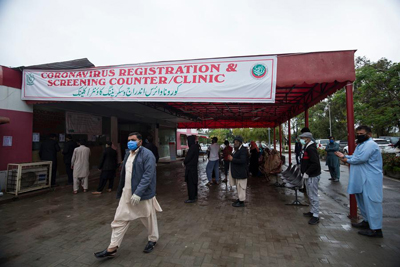Lack of smoking cessation services - a missing link in Pakistan’s tobacco control

After two decades of campaigns against smoking, Pakistan has reported an annual death rate from smoking of 91.1 per 100,000 people, notably higher than the averages for South Asia (78.1) and the rest of the world (72.6). This is an extremely worrying development for a country that the World Health Organization (WHO) has awarded for its tobacco control initiatives.
Pakistan's tobacco control campaign has not been without success. In 1997, Pakistan took the first step of banning tobacco advertisements on electronic media - mainly Pakistan Television. This was the step to ending the ubiquitous smoking ads in print and electronic media. Today we do not see ads for cigarettes anywhere in the country.
After ratifying the FCTC, Pakistan focused on disrupting the access of smokers to cigarettes – a task in which it failed miserably. Pakistan introduced pictorial health warnings (PHWs) on cigarette packs in 2009. These warnings are periodically updated and currently cover 60% of the front and back of cigarette packs. However, the target is to cover 80% of the pack with the PHWs.
Similarly, to discourage tobacco consumption, the government has increased taxes on cigarettes and other tobacco products. Pakistani substantially increased the Federal Excise Duty (FED) on cigarettes during the fiscal year 2022- 23. However, because of the increase in the prices of premium to economy brands, smokers switched to cheaper brands and bought loose cigarettes. This is despite the fact that the sale of loose cigarettes is banned. There is also a ban on sale of tobacco products within a 50-meter radius of educational institutions, though its implementation remains an issue.
However, one area that Pakistan has ignored completely is the provision of smoking cessation services. Pakistan lacks a comprehensive, government-supported national smoking cessation program. While some private organizations and NGOs run small-scale initiatives, their limited reach and resources prevent them from addressing the issue at a national level.
Additionally, many tobacco users are unaware of the availability or importance of cessation support. Public awareness campaigns rarely emphasize smoking cessation as a viable option, focusing more on the harms of tobacco use. This limits demand for such services and leaves smokers without motivation or knowledge about how to quit.
There is also a shortage of trained healthcare professionals specializing in smoking cessation. Doctors, nurses, and counselors often lack the necessary training to provide evidence-based cessation advice, behavioral therapy, or pharmacological interventions.
Smoking cessation services are not integrated into primary healthcare systems. Routine consultations in clinics and hospitals seldom include discussions about smoking cessation or referrals to specialized services, missing critical opportunities to engage smokers.
Pharmacological aids such as nicotine replacement therapy (NRT) and prescription medications for smoking cessation are not subsidized or widely available. Their high cost makes them unaffordable for many tobacco users, particularly those from low-income backgrounds.
In Pakistan, cultural and social factors also hinder the uptake of cessation services. Many smokers view smoking as a personal choice and are reluctant to seek help, while societal stigma can discourage others from accessing support.
A future without combustible smoking is possible in Pakistan. There is a need to develop and implement a nationwide smoking cessation strategy. This should be backed by establishing smoking cessation clinics in public hospitals across all provinces and districts, training healthcare professionals in cessation techniques and counseling, and providing affordable or free access to NRT and cessation medications. There is also a need to include cessation counseling in routine health check-ups.
The lack of adequate smoking cessation services in Pakistan is a critical gap in the country's tobacco control efforts. Addressing this issue through targeted interventions and resource allocation can significantly reduce tobacco-related morbidity and mortality while improving public health outcomes.
اردو مضامین
ترک سگریٹ نوشی کی مخالفت کیوں؟، ارشد رضوی

پاکستان سن 2002 میں ورلڈ ہیلتھ آرگنائزیشن ( ڈبلیو ایچ او ) کے فریم ورک کنوینشن آن ٹوبیکو کنٹرول (FCTC) کا رکن بنا تھا، تب سے اب ( 2023 ) تک اکیس سال گزر چکے ہیں پاکستان (اور دنیا بھر) میں سگریٹ نوشوں میں اضافہ ہی ہوا ہے۔ ایک رائے کے مطابق دو کروڑ نوے لاکھ ( 29,000,000 ) جبکہ بعض رپورٹس تین کروڑ دس لاکھ ( 31,000,000 ) سگریٹ نوشوں کی موجودگی کی بات کرتی ہیں، اگر پچیس کروڑ کی آبادی مان لی جائے تو پاکستان میں 12 فیصد آبادی تمباکو استعمال کرتی ہے۔
ترک سگریٹ نوشی میں مدد گار متبادل، ارشد رضوی

سگریٹ یا تمباکو نوشی کے نقصان دہ اثرات کے بارے میں ستر سال قبل ہونے والی ایک سٹڈ ی میں بتایا گیا تھاتب سے اب تک دنیا میں کروڑوں لوگ تمباکو سے متعلق بیماریوں کے باعث موت کی تاریک وادی میں جا چکے ہیں
صحت، تمباکو اور ریونیو، ارشد رضوی

تمباکو نوشی کا انسان سے رشتہ بہت پرانا ہے۔ تمباکو اور اس سے متعلق مصنوعات کی طویل تاریخ ہے جو 6000سال قبل مسیح میں ملتی ہے۔مقامی امریکیوں کے بارے میں کہا جاتا ہے کہ انہوں نے پہلے تمباکو کی کاشت شروع کی اور یہ 6000سال قبل مسیح میں ہی ہوا۔
انسانی صحت اور عالمی ادارہ صحت، ارشد رضوی

اگر عالمی ادارہ صحت کچھ مختلف طرزِ عمل اختیار نہیں کرتا اور تمباکو پالیسی میں جدّت کو قبول نہیں کرتاتو ادارہ دل، کینسر اور پھیپھڑوں کے امراض میں کمی کے اہداف کے حصول میں بہت پیچھے رہ جائے گا۔
جو فرد سگریٹ نوشی ترک کرنا چاہتا ہے اس کی نیکوٹین کی طلب اور نفسیات کو سامنے رکھتے ہوئے کونسلنگ کی ضرورت ہے، ڈاکٹر احسن لطیف

اگر ہم چاہتے ہیں کہ سگریٹ نوشی ختم ہو جائے تو سگریٹ پینے والوں کواس بارے میں تمام بحث میں سب سے آگے ہونا چاہئے تاکہ وہ اپنی ضرورتوں کا خیال رکھ سکیں۔
ما قبل کورونا اور ما بعد، ارشد رضوی

کورونا کے مابعد اثرات میں ایک خوفناک ترین اثر بڑے پیمانے پر دنیا کی آبادی کے ایک بڑے حصے کا خطِ غربت سے نیچے گِرنے کا اندیشہ ہے جس کے نتیجے میں بے روزگاری اور غربت میں غیر معمولی اضافہ ہو گا۔
OUR PROJECTS
Pakistan is a country with heavy use of tobacco. With more than 24 million...
Read MoreRESEARCH ARTICLES
The Birth of Harm Reduction Informs the World's Need for Safer Nicotine...
Read MoreWHAT WE DO?
Alternative Research Initiative (ARI) works to provide researched-based solutions...
Read More
